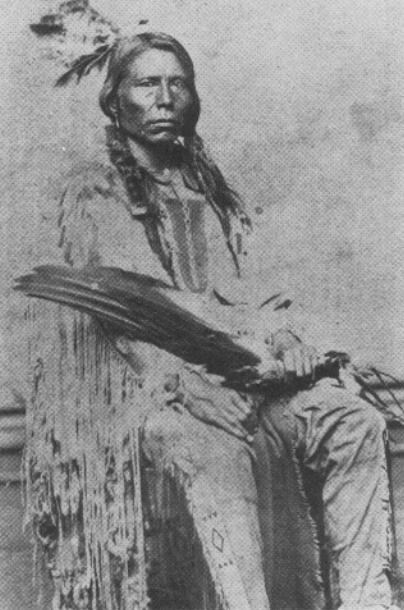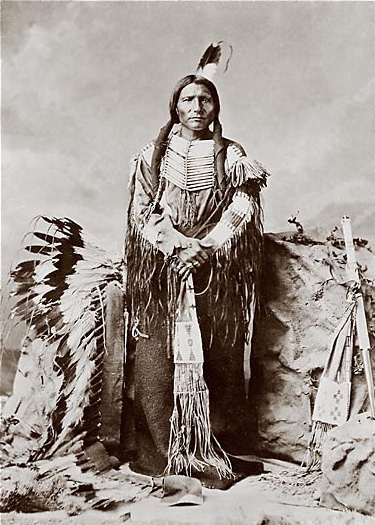 |
| Chief Crazy Horse, thought to be the few photographs ever taken (http://www.manataka.org/images/Crazyhorse%20Photo.jpg) |
A man known and unknown to mankind. He was known among his people, and also to many generations, but considering the impact he made to his people because of his kindness, generosity, and bravery, he should be more known to the world. This man achieved, failed, succeeded and was victorious during his lifetime. His name was Crazy Horse. He was a man with very keen senses, a fearless heart, a dauntless mind, and most important, he is my hero. He fought for what was right. He fought for his people and he fought for his way of life. Although he knew he was putting himself at risk, he never gave up. He has been honored with a great reputation among his people, even having a monument built in the Black Hills of South Dakota as a reminder of his impact of heroism for his people, the Native Americans of this country. Many books have been written about him. Today, Crazy Horse has renowned glory throughout America!
 |
No other person affects me like Crazy Horse. His actions inspire me to live my life with courage and perseverance. Like him, I have learned to stand up for my own beliefs. Respecting others, caring for elders, and being true to oneself is what really inspires me the most. Crazy Horse never backed away from trouble; never in his life did he show weakness. He showed courage and bravery in difficult situations. That to me is very amazing. Without realizing it, he inspired many people like me during his life and beyond his years on earth. He has inspired me to be proud of myself even if I make mistakes along the way; I continue to try again and am proud of myself.
 |
Crazy Horse was a warrior in the 1800's, in the Lakota Sioux Tribe. The Sioux Indians lived in the Black Hills of South Dakota near the Red River. The Sioux were one of the strongest tribes in the United States, but against the U.S. army, they seemed like small, exiguous people. When Crazy Horse came along, the Sioux were helpless and desperate.
Crazy Horse had many family members. His father was named Worm. His mother died when he was seven or eight years old. Young Crazy Horse would cry for his mother at night--having nightmares for many years. After his mother died, friends were always trying to find a way to make him and his family happy. His older sister was about ten years older than Crazy Horse and was said to give him great encouragement to raise his spirits. He also had a little brother who looked up to him. Black Shawl was the name of his wife and his noble companion. She was always supportive of him and never doubted him. She was diagnosed with Tuberculosis. His cousin, Black Elk, made a huge impact in his life and fought in many battles with Crazy Horse. Another friend named Hump was very influential, even saving his life more than one time.There has been controversy over how Crazy Horse got his name. One story says that he had a vision that showed him riding a horse with rain, thunder, and lightning falling upon his face. As lightning struck his face an eagle, resembling a great warrior, flew close by and the lightning left a mark on his face. In Lakota language, Crazy Horse means, "holy, mystical, or an inspired horse." It also means an a horse that can do extraordinary feats.
 |
Crazy Horse was born between 1840 and 1845. It was said that he was his father’s favorite child. His father always was around for him and in future years this would make him happy when remembering his early life. At age five, when his father captured at least four deer for his family, young Crazy Horse was trying to be generous and told all of the elders that his family had a surplus of food for everyone. His family did not, but could not say no to the hungry and shared their food. When he was young, Crazy Horse was said to be quiet, thoughtful and determined, always going the extra mile.
Crazy Horse fought in parts of Wyoming, Colorado, Nebraska, South Dakota and Montana. This is evidence that Crazy Horse fought for the benefit of more than his own tribe, fighting for many other tribes around the country. When he was young, Crazy Horse sneaked into a war party and persuaded the warriors to let him be their errand boy. As he showed his warrior skills, they let him attend hunts and small battles. By the age of fourteen, he had a chance at battle and killed three men. Crazy Horse fought for his people in many battles and he never gave up on trying to make a better life and future for his people. For that, he earned himself the position of chief. He gained knowledge through his battles that helped him make better decisions in every battle. There were many battles through the years. From 1876 to 1877 when the Sioux, Cheyenne, and Arapaho tribes were expanding their territory and were fighting against the U.S. army, war broke out. The army wanted control of those territories. This final war was the most important for Crazy Horse. He chose to either let his people die of hunger or live in an Indian encampment. Finally, Crazy Horse gave in, rather than see his people perish. After they surrendered to the U.S., the Sioux, Cheyenne, and Arapaho were sent to an Indian encampment. On a lonely day, Crazy Horse saw that his wife was very ill and he escaped the custody of the encampment to take his wife to his elders off the reservation. Every soldier got notice of his escape but did nothing until his return. Crazy Horse knew the consequences if he were captured and bravely returned to the encampment. A great man like Crazy Horse could only die with dignity and pride. He let himself be arrested, but then saw that he was being taken to a jail that he did not consider acceptable. Crazy Horse struggled with the soldiers and was stabbed in the process. He said, "It is well to be brave in the field of battle, it is cowardly to display bravery against one’s own tribesmen," and died. Even if Crazy Horse did die, he still lives in my heart. Crazy Horse was a man of his word; his life resembles hope and peace for many others. He did not give up when things looked dismal. He had the responsibility of making decisions for an entire nation of Indians who were outnumbered and out-weaponed. He was humble and generous, he also a man that showed absolutely no fear. Like all men, he had flaws, but with every mistake, tried to make things better. He made suitable choices for others. He is very inspiring, and he is a man who has exceeded the expectations of most men in his ability lead. To me he is a great hero.Page created on 10/22/2009 12:00:00 AM
Last edited 10/22/2009 12:00:00 AM
Freedman, Russell . The Life and Death of Crazy Horse. Holiday House/New York, 1996.
Eastman, Charles A.. "Legends of America." [Online] Available http://www.legendsofamerica.com/NA-CrazyHorse.html. 2003.
Wikipedia. "Wikipedia." [Online] Available http://en.wikipedia.org/wiki/Crazy_Horse. 2009.
